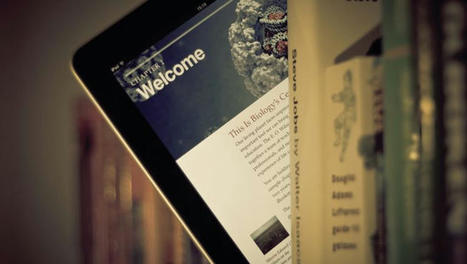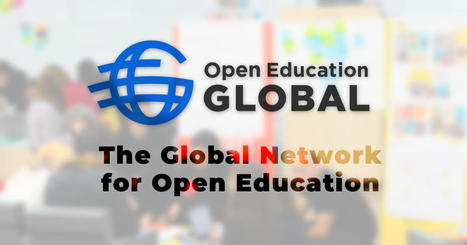 Your new post is loading...
 Your new post is loading...

|
Scooped by
Valary Oleinik
June 5, 2023 9:58 PM
|

|
Scooped by
Valary Oleinik
November 28, 2022 10:58 AM
|
Open Education Global (OEGlobal) is honored to announce the 2022 winners of the Open Education Awards for Excellence. The 12-member strong Open Education Awards Committee, comprised of educators and open education advocates from around the world, has reviewed the 89 nominations from across 22 countries. The sky is shining with open education luminaries from around the world! From Canada to Ukraine, we are celebrating new OER created by students, awesome adaptations of open textbooks and an amazing platform that allows the curation, customization, and remixing of digital bookshelves. And if that wasn’t enough, wait to be dazzled by the outstanding examples of teamwork, collaboration and solidarity beaming through all the open practices categories —from regional networks helping each other, to opposite continents joining forces to save the world’s forests. Expect to be moved by the resilience of a brave network of librarians determined to continue to support students and teachers even in extreme conditions. I’m sure you’ll be inspired by all of them as much as I am.”Marcela Morales, OEGlobal Director of Community Relations and OEAwards Liaison OEGlobal is pleased to congratulate the fifteen Open Education Awards for Excellence winners across 15 categories in 2022. In addition to the usual 13 categories, in 2022 we celebrate the contributions to two special categories: 1) The Open Resilience Award, which recognizes and celebrates efforts to overcome adversity, pivot quickly and thrive in the face of unprecedented challenges or crises, and 2) The Diversity, Equity and Inclusion Award to foreground efforts focused on creating diverse, inclusive and equitable opportunities in learning environments. The 2022 winners are …. OPEN INDIVIDUAL Winners Open Education is a human movement that is only possible due to the work and passion of extraordinary people. Every year, Open Education Global is honored to recognize these individuals in the Open Education Awards for Excellence. The 2022 Open Individual winners are: Lifetime Achievement Award goes to Robert Schuwer at Fontys University of Applied Sciences, Eindhoven, The NetherlandsOpen Leadership is awarded to Ebba Ossiannilsson at Swedish Association for Open, Flexible and Distance Education, Lund, SwedenOpen Educator is awarded to Giovanni Zimotti at The University of Iowa, Iowa City, USAEmerging Open Leader is awarded to Sarah Kresh for her work at CUNY School of Professional Studies, New York, USAThe Support Specialist Award goes to Ewan McAndrew for his work at the University of Edinburgh, Edinburgh, UK OPEN ASSETS Winners Open assets are digital or printed materials that open education initiatives produce and use to add purpose and value to their education in their sector. Open assets are produced, curated, and distributed in ways that make them freely accessible, usable, and improvable by others. The 2022 Open Assets of excellence in 2022 are: Best OER award goes to Liberated Learners is co-designed and co-created by staff and students at Trent University, Brock University, Seneca College, University of Windsor, McMaster University, Cambrian College, and Nipissing University, CanadaOpen Curation / Repository is awarded to LibreTexts, a powerful OER curation/repository supported by the University of California-Davis, USAOpen Reuse / Remix / Adaptation goes to Open Technical Communication textbook by Tiffani Tijerina, Tamara Powell, Jonathan Arnett, Monique Logan, Cassandra Race, and multiple contributors at Kennesaw State University, USAOpen Infrastructure award goes to LibreTexts for the LibreText platform, supported by UCDavis University of California, USA OPEN PRACTICES Winners The Open Practices Awards categories celebrate the collective behaviors and techniques that ensure open access to educational opportunities. These practices promote and support the use of open educational resources, technologies, and social networks to facilitate collaborative and flexible teaching and learning. The Open Practices being celebrated in 2022 are: Open Collaboration is awarded to the European Network of Open Education Librarians created and supported by SPARC Europe, Italy.Open Innovation for the Innovative Sustainable Forest Management Education Online Course at the Asia-Pacific Region: Asia Forest Research Centre, Faculty of Forestry, University of British Columbia, CanadaOpen Pedagogy is awarded to the Open Pedagogy Project Roadmap, compiled by Riehman-Murphy and McGeary at Pennsylvania State University, USA.Open Policy Award goes to the OERTX Initiative implemented by the Texas Higher Education Coordinating Board, Texas, USA. SPECIAL AWARDS Winners The Open Education Awards for Excellence provides annual recognition for outstanding open education contributions from the Open Education community. Each year, the core categories (individual, assets & practices) remain the same each year. However, the OEAwards are always looking for ways to celebrate new trends and emerging innovation within the Open Education Movement. The Special Awards this year shine the spotlight on: Diversity, Equity & Inclusion Award goes to OpenLearn’s Race and Ethnicity Hub from the OpenLearn Team at The Open University, UKOpen Resilience Award goes to the advocacy work of the Scientific Library to advance Open Education in Ukraine spearheaded by Tetiana Kolesnykova, Ukrainian State University of Science and Technologies, Ukraine Read about the OEAward Winners in more detail on this page. Congratulate the winners on OEG Connect What do you think of the winners? Add to the discussions below and share your experiences of these people and platforms by clicking on reply on OEG Connect below.

|
Scooped by
Valary Oleinik
November 28, 2022 10:56 AM
|
This year, we’re trying something different for the #OEAwards. Every year, the Open Education Awards for Excellence recognizes outstanding contributions in the Open Education community, recognizing exemplary leaders, distinctive Open Educational Resources, and Open Practices from around the world. In 2022, we’re announcing the #OEAwards shortlist of finalists first. The shortlist celebrates 12 open leaders and 33 open education initiatives and practices across the 14 awards categories. “Behind every nomination there is always a story to tell of collaboration, enthusiasm, and creativity. The extraordinary work of the open community never ceases to amaze me. This year I’m excited to see important efforts to develop resources and practices that are more diverse, equitable and inclusive.”Marcela Morales, OEGlobal Director of Community Relations and OEAwards Liaison The shortlist was selected from 89 nominations of open education excellence across 22 countries by the 12 members of the OE Awards 2022 Committee and OEGlobal Board Members. The finalists (in alphabetical order) are … PEOPLE IN OPEN Leadership Award Delmar LarsenEbba OssiannilssonRobert Schuwer Educator Award Saifa HaqueSushumnarao TadinadaGiovanni Zimotti Emerging Leader Award Luis Clemente Jiménez BotelloSarah KreshAndrea Scott Support Specialist Award Beatriz CanalesEwan McAndrewEllie Svoboda WHAT WE SHARE Best OER Explorations: An Open Invitation to Biological Anthropology from California State University ChicoLiberated Learners from Trent UniversityMoo MOOC: Milking your OER from University of EdinburghOpen RN Nursing Mental Health and Community Concepts from Chippewa Valley Technical CollegeOpen RN Nursing Management and Professional Concepts from Chippewa Valley Technical CollegeSalón de clase: Intermediate Spanish for Education Professionals from Binghamton University – SUNYSchool for All: promoting an anti-racist education from Fundação Telefônica VivoStrategic Communication to Counter Security Threats in the Disinformation Era from Universidad Rey Juan Carlos Open Curation / Repository Digital Self-Learning Initiatives from the French Digital University (l’Université Numérique) LibreTexts at University of California-Davis Open Courseware at King Khalid University (KKU)Repositorio de Recursos Educativos Abiertos from Ceibal Open Reuse / Remix / Adaptation An ENOEL Toolkit – Benefits of OE for everyone to reuse from SPARC EuropeOpen eTextbooks for Access to Music Education from University of EdinburghOpen Technical Communication from Texas Tech University Open Infrastructure LibreTexts at University of California-DavisOpen Educational Resources American Public University System from American Public University SystemTAO from Open Assessment Technologies HOW WE SHARE Open Collaboration European Network of Open Education Librarians from SPARC EuropeThe ICDE OER Advocacy Committee from Swedish Association of Distance EducationLiberated Learners at Trent University Open Innovation Innovative Sustainable Forest Management Education in the Asia-Pacific Region from the Asia Forest Research Centre, UBC Faculty of ForestryTextbook Transformation Project at Chaffey College Open Pedagogy Evaluating OER for Social Justice at Lehman College, CUNYThe Open Pedagogy Project Roadmap from Pennsylvania State UniversityTeachOER, an online repository of OER resources and openly-licensed teaching materials from Baruch College-CUNY SPECIAL AWARDS Diversity, Equity & Inclusion Award Ewan McAndrew, Wikimedian in Residence: Wikimedia and Equality, Diversity and Inclusion at University of Edinburgh, UKOpenLearn’s Race and Ethnicity Hub at The Open University, UKReading Wikipedia in the Classroom – Bolivia 2021-2022 from Wikimedistas de Bolivia Open Resilience Award Advocacy work of the Scientific Library to advance Open Education in Ukraine from the Ukrainian State University of Science and TechnologiesTALON at the University of Calgary The winners will be announced on October 20th. Save the date! Read about the finalists in more detail on this page. Join the Discussion in OEG Connect What do you think of the shortlisted finalists? Add to the discussions below, share your experiences of these people and platforms by adding a reply in OEG Connect.

|
Scooped by
Valary Oleinik
November 28, 2022 10:53 AM
|
Institutions We are pleased to announce the publication of our report, Open Education in European Libraries of Higher Education: Implementing the UNESCO Recommendation on OER. The report presents the findings of the third edition of our annual survey of European academic libraries on the topic of Open Education (OE) and Open Educational Resources (OER). It explores the work being done by European academic librarians to implement the UNESCO OER Recommendation, almost three years on from its initial publication in November 2019. Our 2022 survey is structured according to the five areas of action/objectives of the UNESCO OER Recommendation (indicated below) and includes detailed recommendations for each objective: Objective 1 — Building capacity; Objective 2 — Developing supportive policies; Objective 3 — Encouraging diverse, equitable, and inclusive (DEI) access to quality OER; Objective 4 — Sustaining OER; Objective 5 — Promoting and reinforcing international collaboration. This report also compares and contrasts differences with last year’s survey results.We show that awareness of the UNESCO Recommendation has increased year-on-year – particularly this year – with libraries taking more action. On the one hand we are seeing that libraries increasingly getting involved in OE policymaking, and on the other they are getting more involved in supporting OE support and implementation.Nevertheless, many libraries still need to decide on what role to take in this environment. Building capacity in this area in libraries is still a priority, and this includes leadership skills, which is still one of the library’s key challenges in this area. Furthermore, a critical area of importance in Europe is the need for more targeted work to address DEI effectively in OE and OER work, which is still limited. A lack of resources and few opportunities to engage projects, partly due to few grant funding opportunities, will stand in the way of accelerating open education.We are sure to see more action to open up Higher Education when libraries continue to collaborate together and with other departments, teachers and learners for more equitable access to quality education.For any questions, please contact Paola Corti via email at: pcorti@sparceurope.org. We encourage libraries and their institutions to read the report and the insights therein and spread the word to all interested in the topic. Read the report and recommendations here.

|
Scooped by
Valary Oleinik
April 8, 2021 1:38 PM
|
Dive into research on open educational resources' effectiveness in terms of student performance and recommendations to support OER in class.
|

|
Scooped by
Valary Oleinik
June 5, 2023 9:58 PM
|
Why say OERs when Open Educational Resources is already plural? A guest post from librarian Emma Wood on the confounding inconsistencies of language.

|
Scooped by
Valary Oleinik
November 28, 2022 10:56 AM
|
Here's how you can effectively use Open Educational Resources (OERs) and avoid pitfalls when integrating them into your course.

|
Scooped by
Valary Oleinik
November 28, 2022 10:55 AM
|
Teach Access, a nonprofit focused on digital accessibility skills education, is launching a collection of free online teaching resources designed to help faculty teach accessibility across a range of computer science, technology, and design programs.

|
Scooped by
Valary Oleinik
November 28, 2022 10:51 AM
|
Thanks to the University of Sheffield Library (Helen Moore and Maria Mawson, Faculty Librarians) for allowing us to repost this blog in relation to Open Access Week. In this May 2021 blog post we addressed the issues surrounding the provision of textbooks, issues not caused by the pandemic but certainly magnified during that time. We’re unlikely to see any improvements unless we’re willing to make some radical changes and look at alternative models of textbook provision. We’ve recently begun to look at Open Educational Resources (OER) and assess how much of a game-changer they could be. What is OER? UNESCO defines OER as “teaching, learning and research materials in any medium, digital or otherwise, that reside in the public domain or have been released under an open licence that permits no-cost access, use, adaptation and redistribution by others with no or few restrictions.” What are the benefits of OER? They are free for everyone to read, adapt and distribute without limitation. Your students can access open textbooks and other OER at no cost to themselves or the institution They have a pedagogical impact – you can manipulate OER in a way you can’t commercial textbooks OER enable your academic freedom and professional autonomy. You don’t have to teach a class based on what a commercial publisher provides, so the material can be adapted to suit the needs of your students, and your learning outcomes If you want to customise textbook content to suit your curriculum OER allows you full flexibility Students do just as well, if not better, with OER (see Open educational resources, student efficacy, and user perceptions: a synthesis of research published between 2015 and 2018. Also, Efficacy of open textbook adoption on learning performance and course withdrawal rates: A meta-analysis – Virginia Clinton, Shafiq Khan, 2019) They don’t harvest student data unlike some commercial publisher platforms (e.g. SEC fines Pearson $1m for misleading investors over cyber breach) You can involve students as co-creators and contributors (see Open pedagogy: a guide to making open textbooks with students) They address the University’s Project Level Approach priorities of: Employability: students retain access to OER after graduation. They support graduates who are practitioners and need ongoing access to key texts in their field, and they can be instrumental in lifelong learning. Inclusivity: many of us are aware that commercially published texts are often US- or Euro-centric. OER present an opportunity to include material that’s more representative of the global scholarly community. Sustainability: OER can offer longevity. Traditionally published material, particularly in digital format, can be withdrawn with little or no notice, or prices and access models changed to make it difficult to purchase for our institution. OER are preserved and curated for the long term, always remaining free at the point of use. How can I find OER? You can already find freely available material in StarPlus (University of Sheffield Library Catalogue) and there’s an ‘open access’ filter to help you do this. Unfortunately, it’s not that easy to see at a glance what the licence terms are, so you can’t readily tell whether a work can be modified for your own use. We’re working on this! In the meantime sources such as the Open Textbook Library, OER Commons, MERLOT, and MIT open courseware are useful starting points. What’s next? Our new content strategy clearly states our support for initiatives in the field of open scholarship. We want to hear from you – from the students and staff in our core communities – as we begin to develop the infrastructure and services to support the discovery, use and creation of OER. We’re working closely with the university libraries of Leeds and York to progress these objectives and have recently launched the White Rose OER Toolkit. In the meantime get in touch with us, make your views known and let us know about any OER work you’ve created.
|

 Your new post is loading...
Your new post is loading...
 Your new post is loading...
Your new post is loading...
















